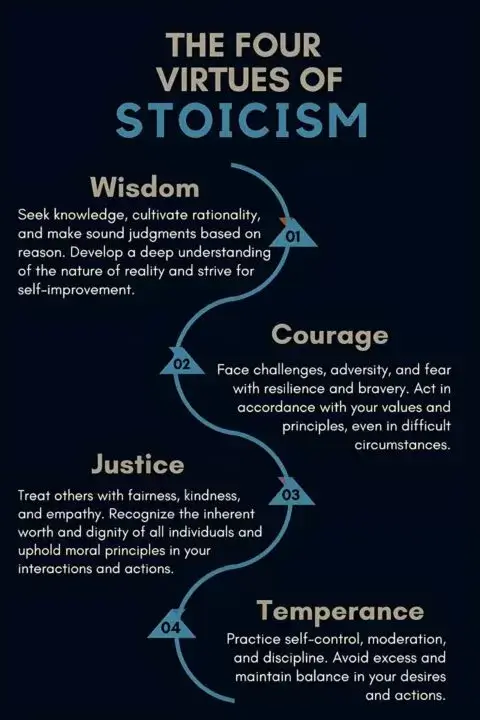— Researched and written by Dr. Sandip Roy.
Stoicism is a Greco-Roman philosophy that began in 301 BCE to bring philosophy out of the classrooms to the people on the street. Its founder, Zeno of Citium, gave his lectures at the marketplace called Stoa Poikilê.
In those days, Stoicism taught how to find the path to true happiness by focusing on virtue, wisdom, and self-control. Those Stoic teachings are still useful in our modern world.
Many people don’t know that Stoic ideas helped create modern psychological methods like Cognitive Behavioral Therapy (CBT) and emotional intelligence (EI).
Key Takeaways
The four main takeaways here are:
- Live Virtuously To Be Happy: Stoic masters taught that virtue in thoughts and actions is both necessary and sufficient to achieve true happiness (eudaimonia).
- Practice The Power of Now: The best way to find strength and optimism in all life’s experiences is to live in the present moment and appreciate life as it unfolds.
- Learn Control & Acceptance: Focusing on what’s within our control, and accepting what’s beyond it, is the Stoic art of peaceful living that works even today.
- Embrace Emotions Wisely: Stoicism asks us to not suppress our feelings, but to embrace the full range of emotions with mindfulness and moderation.
What is Stoicism In A Nutshell
Stoicism is a 2,000-year-old philosophy founded by Zeno of Citium that teaches that happiness can be found through personal virtue and rationality. It focuses on four cardinal virtues: wisdom, courage, justice, and temperance.
They believe that true contentment comes from inside us, not from things like money or fame. Stoics strive to master what they can control — their thought, words, and actions.
They accept what they can’t change, like bad weather or other people’s actions. This “amor fati” mindset helps them stay strong, calm, and grateful through life’s experiences.
In short, Stoicism is about living a good and meaningful life, grounded in self-control and mindfulness, and dealing with life’s ups and downs with resilience.

Core Tenets of Stoic Philosophy
Stoicism stands on three main principles — Virtue, Logic, and Nature — which form the building blocks for a good and thoughtful life. These help a Stoic live a useful life, make wise choices, and cope with life’s challenges calmly.
1. Virtue
Virtue is the heart of Stoicism. It is about being the best version of yourself. Stoics think that living a life of virtue is the only way to be happy.
Their four cardinal virtues are:
- Wisdom — It means making smart choices, learning from life, and understanding the important things you should focus on.
- Courage — It is not just about being brave in danger, but also having the ability to face everyday challenges and speak the truth even when under threat.
- Justice — It stands for being fair to others, doing the right thing, and helping out where you can.
- Temperance — It means self-control. It’s about finding balance and not going overboard, whether it’s with emotions, food, or anything else.

2. Logic
Stoic “Logic,” developed by Chrysippus, was one of the two great systems of logic in the classical world.
- Stoic logic was more than analyzing arguments. It also included how words were said (rhetoric), how they were written (grammar), what they knew (knowledge), and even how people spoke them (lekta or “sayables”).
- Dialectic, a field within Stoic logic, was the science of finding truth and meaning through the exchange of logical arguments.
- They felt logic was necessary to understand reality about the world, Nature, and ourselves.
3. Nature
In Stoic philosophy, “Nature” refers to two main things:
- the nature of the universe, and
- the nature of human beings.
When the Stoics talk of “living in accordance with nature,” it means aligning oneself with the rational order of the universe and other human beings.
It also involved using Reason to distinguish between good, bad, and indifferent, and cultivate wisdom, courage, justice, and temperance.
They saw Nature as an interconnected, well-ordered system. And felt that when a person lives in harmony with Nature, they can willingly accept the sequence of events fated by the universe.
Stoicism and Mindfulness
Mindfulness, or being fully present and engaged in the current moment, is a key aspect of Stoicism. Stoics value attention and being in alignment with our values.
Stoic mindfulness involves regularly checking in with ourselves, and observing our thoughts, emotions, and actions without judgment.
It also includes practicing the dichotomy of control, focusing our attention on what we can control and accepting what we can’t.
In a way, Stoic mindfulness is really about seeing what is up to you in any given situation, focusing on doing that well, and on doing the act with wisdom and virtue.
Stoicism and Amor Fati
The Stoics believe in the idea of loving their fate, or amor fati.
It is the premise is that if you accept what you can’t change, then you won’t be frustrated when it happens.
This allows the Stoics to keep an optimistic outlook on their situation, no matter how bleak it seems, and to keep working for a brighter tomorrow.
To love only what happens, what was destined. No greater harmony.
— Marcus Aurelius, The Philosopher King
Stoic View of Emotions
Stoicism isn’t about not suppressing emotions; it’s about experiencing them in a balanced way.
Stoics believe that emotions come from our thoughts and judgments. This teaches us that by changing the way we think, we can better handle our feelings.
Surprisingly, this insight forms the basis of Cognitive Behavior Therapy (CBT), which works on the principle that altering our thought patterns can significantly impact our emotional well-being and behavior.
‘Apatheia‘ is an important Stoic idea. It’s not about avoiding emotions, but disallowing strong emotions to control our behavior. It means keeping our emotions steady, even when things get tough.
So, Stoics allow themselves to feel all emotions without getting carried away by either the positive or the negative ones.
From them, we learn that it is alright to feel things like sadness without letting them overwhelm us.
The Stoics called the negative emotions “pathe” (suffering), and held that they result from our judgments about the world.
So they avoid making judgments about situations and people. Instead, they prefer to accept people and situations as they are, which helps avoid the negative effects of lingering feelings.
Stoicism, thus, helps us handle our feelings more healthily, letting us stay calm and strong even when things are hard.
Stoicism and Dichotomy of Control
The Dichotomy of Control is a fundamental concept in Stoicism. It is about wisely distinguishing between things that are within our control and things that are outside our control.
Epictetus, a prominent Stoic philosopher, said what is within our power are our opinions, motivations, desires, and aversions, as well as our own actions. Meanwhile, things like our body, property, reputation, and other people’s opinions are not within our power.

It also tells us we cannot change what has already happened, but we can control our response to it. So, we should learn to live forward without carrying the burdens of shame, remorse, disgust, or guilt from our past.
Living forward means taking lessons from the past to direct our thoughts, choices, and actions in the present moment.
Stoicism and Death
Stoicism’s views on death are rooted in the belief that death is a natural and inevitable part of life.
The Stoics saw death as a precondition for life, that is, life without death is simply impossible.
By accepting the inevitable role of death in the human experience, the Stoics believed that we could cultivate mental tranquility, gratitude, and a sense of acceptance, ultimately leading to a more fulfilling and meaningful life.
They also believed that life was not just short and unpredictable, it was often painful. Wasting it on doing useless things only adds to that pain. So, they advised:
- Stop whining about people spoiling your day or mood – they are what they are. Instead, expect to come across some “wicked, ignorant, ungrateful” people every day. Our good comes from us, not others.
- Don’t turn away from the harsh times. Instead, meet adversities with the wisdom that they will pass, and hold the same thought for the good times. The trivial and the vital, the blissful and the painful, all fade away.
- Stoic philosophy emphasizes self-control and the rule of reason. It tells us to not let our emotions dictate us and to use reason to make any decision that we make.
Be tolerant with others and strict with yourself.
— Marcus Aurelius, The Philosopher King
Stoicism and Memento Mori
Stoic philosophy urges the practice of memento more.
Memento Mori is a Latin phrase that means “remember you must die.” It is a reminder of the finite nature of our lives and encourages us to live in the present moment and appreciate life.
The Stoics believed that contemplating death could help us live a more meaningful life and make the most of our time. So they frequently meditated on death and wrote about it in their works.
Think often on the swiftness with which the things that exist and that are coming into existence are swept past us and carried out of sight. For all substance is as a river in ceaseless flow, its activities ever-changing and its causes subject to countless variations, and scarcely anything stable.
— Marcus Aurelius
Memento Mori is when we think about death and try to live a good life.
FAQs
What is Stoicism?
Stoicism is defined as an ancient Greek school of philosophy founded by Zeno of Citium in Athens. The school taught that Virtue, the highest good, is based on knowledge; the wise live in harmony with the divine Reason (sometimes equated with Fate and Providence) that governs Nature, and are indifferent to the whims of fortune, as well as pleasure and pain.
What are the four main ideas of Stoicism?
The four major ideas of Stoicism are Virtue, Nature, Apatheia, and Eudaimonia. Virtue has four subtypes: wisdom (the root virtue), justice, courage, and moderation. Nature or the cosmos is perfect and everything that happens is predetermined, so all outcomes must be accepted. Apatheia or equanimity is a state of mind unaffected by the passions. Eudaimonia is the ultimate goal of life, and a good life comes from the pursuit of virtue.
[Download the PDF: Stoicism—Short Summary]
• • •
Final Words: How To Be A Stoic?
Finally, for a Stoic, the purpose of life is to live in harmony with nature, which can only come from a life of virtue, which then leads to a life of joy (eudaimonia) that is free of suffering (apatheia).
You can become a modern Stoic by:
- Choosing virtue every time, whether anyone is watching or not.
- Suffering and enjoying this human existence, and yet do both in moderation.
To know more, dive into any of our highly popular posts:
- Premeditatio Malorum: The Stoic Idea of Negative Visualization
- The Surprisingly Unusual Life of Zeno: Founder of Stoicism
- How To Practice Stoicism: 18 Stoic Exercises You Must Try
- How do Stoics deal with narcissists and selfish people?
- Memento Mori: Why Must We Keep Death In Mind?
√ If you enjoyed this, please spread the word.